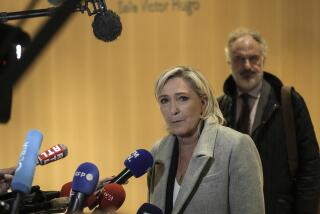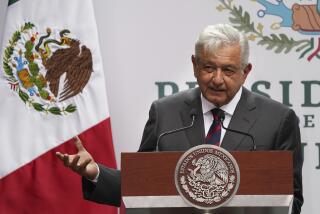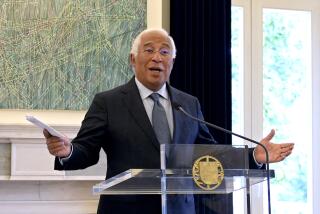Spain’s ruling party leaders face corruption allegations
MADRID -- Corruption allegations swirling around Spain’s ruling party threatened to ensnare the prime minister for the first time Thursday when a newspaper published photos and excerpts of secret accounting ledgers that purportedly reveal under-the-table cash payments to top conservative politicians.
The ruling Popular Party’s No. 2 leader, Maria Dolores de Cospedal, quickly called a midday news conference to say that the logbooks excerpted by El País did not look familiar. She denied any wrongdoing. Prime Minister Mariano Rajoy called an emergency meeting of party leaders for Saturday.
El País said the handwritten ledgers belonged to Luis Bárcenas, the party’s former treasurer, who resigned in 2009 after his name surfaced in an investigation into illegal payments for government contracts. Bárcenas retained an office and private parking spot at party headquarters in Madrid until this month, when the National Court, which is investigating him, revealed that he has an undeclared Swiss bank account that at one point contained $29 million.
At least one former lawmaker has also accused Bárcenas of handing out envelopes stuffed with “black money” -- off-the-books cash -- at party headquarters on a monthly basis.
The ledgers published by El País on Thursday are allegedly part of Bárcenas’ secret accounting of those “bonuses” to party leaders, dating from 1990 to 2009. The money reportedly came from donations by construction companies and other businesses. It’s unclear what influence, if any, those firms sought.
The entries labeled with Rajoy’s name cover about $34,000 in annual cash payments between 1997 and 2008. Rajoy was a Cabinet minister until becoming party leader in 2004. The ledgers also reveal payments to Cospedal and former International Monetary Fund chief Rodrigo Rato, who served as Spain’s economy minister in a previous conservative government.
The ruling party has already ordered internal and outside audits of its finances. “We have absolutely nothing to hide,” Cospedal told reporters Thursday.
Until 2007, it was legal for political parties in Spain to receive anonymous donations, which had to be declared on income tax forms. It’s unclear whether that was done in this case.
In recent weeks, corruption scandals have dogged both major political parties, as well as the royal family. King Juan Carlos’ son-in-law is being investigated for allegedly embezzling millions of dollars in taxpayers’ money that was supposed to be destined for charities. But the logbooks published Thursday, if authentic, are the first evidence implicating Rajoy.
Allegations of fraud and cronyism among the political elite come at a particularly sensitive time for Spaniards, who are suffering 26% unemployment. Rajoy has asked for the public’s trust as he and his party implement the harshest austerity measures in Spain’s democratic history, in an attempt to avoid an international bailout.
A poll of Spaniards published this month revealed that 96% of respondents believe corruption is “very high” among their leaders.
ALSO:
Allies of Syria condemn reported Israeli attack
Land mine blast kills 2 polio workers in Pakistan
Donors pledge about $1.5 billion in Syrian aid
More to Read
Sign up for Essential California
The most important California stories and recommendations in your inbox every morning.
You may occasionally receive promotional content from the Los Angeles Times.










